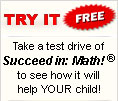Archive for the ‘Dyscalculia’ Category
Are You Afraid of Math? Overcome Dyscalculia By Facing Your Fear
Is math one of those subjects you have always been afraid of? Were you never that good at it? Well, if math is something you are scared of and would like to finally put that behind you, this will help you. That fear you have of math can be better defined as dyscalculia. Dyscalculia is the term used to describe a fear of math and numbers. Whether you are not sure how to properly process numbers, solve equations, remember certain steps or manage your time, the tips below will be able to help you. Now is the time for you to overcome dyscalculia fast!
Stop trying to tell yourself you will one day get over your fear of math. It is not going to be something you will simply outgrow on your own. If you would like to put that fear of numbers behind you, keep reading.
You need help when it comes to math and that is normal. Math is one of the most difficult subjects out there to master and most children will continue struggling in it. It does not matter if you are ten or forty, a fear of math can stick with you for your entire life. That is why it is important you do something about it now before you let it continue to take a toll on your life. Put your fear of mathematics in your past for good by following steps like these.
An easy way to overcome dyscalculia is to face your fear. Start doing what is it that scares you about math. If it is solving equations, try sitting down and solving a few. If you cannot get to the answer right away, do not give up so fast. Keep trying until you can get to the right answer. Doing this a few times will help you see you can do it and that there is nothing to be afraid of.
What most individuals hate most about math is the thought of having to remember all those rules and steps. Remember how nerve raking it was to sit a desk and go through numerous math questions in a certain amount of time? If you were never very good with math exams, do not worry.
The tips offered will help you easily get over your fear of numbers for good. You will no longer have to let your fear of math control your life. Overcome dyscalculia fast.
If your child struggles with math there is an effective and fun way to help them. By using an innovative computer program designed to engage your child’s mind you’ll be helping them with their numerical processing in a way they’ll enjoy. You can help your child deal with dyscalculia with an appealing, fun-filled software program disguised as a game. You can find more information about it here: https://www.dyscalculianomorereview.com/gamesoftware
What Are The Symptoms of Dyscalculia In Children?
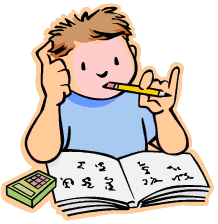 Symptoms of dyscalculia in children can vary from moderate to severe, but if you’re a parent with a child who has ANY type of learning disability, the severity of it doesn’t matter. You’ll do everything you can to help your child overcome it. It’s what we do.
Symptoms of dyscalculia in children can vary from moderate to severe, but if you’re a parent with a child who has ANY type of learning disability, the severity of it doesn’t matter. You’ll do everything you can to help your child overcome it. It’s what we do.
That being said, some of the most common signs of dyscalculia in children are listed below.
What are the Symptoms of Dyscalculia in Children?
- Anxiety when it comes to math
- Trouble differentiating between left and right
- Difficulties understanding basic math concepts, such as simple addition and subtraction
- Has trouble recognizing and remembering shapes
- Has trouble recognizing numbers, and putting them in ascending or descending order
These are just a few of the basic symptoms a child may exhibit if they have dyscalculia. Obviously they are not meant to be a defining test on whether or not your child has the learning disability, rather they’re meant to be just a starting point. If your child has any of the difficulties listed above, it is absolutely possible they struggle with math dyslexia – It is also absolutely possible your child just doesn’t like or understand math yet.
Jumping the Gun
Do not jump the gun just because your child shows the signs above. Of course, you can take precautions and help your child define and practice their math skills. There are games you can play with him or her, flash cards to practice with, and also software computer games that help your child become better at math.
Dyscalculia is a serious learning disability and if left untreated can cause unnecessary stress to your child’s future (and your mental health as their parent!) There is no cure for dyscalculia, but there are certain ways to help treat it. This website has a lot of different articles you can read, and is meant to be used as a resource.
Helping Your Child Practice
Math games are a great way to get your child to practice. The beauty of it lies within your child not knowing they are practicing math. Here is a site that has great software computer games that your child will love doing: Math game software
Dyscalculia Symptoms In Children – Signs To Look For
If you suspect your child has dyscalculia, you’ve most likely noticed some concerns of the learning disability. This article is meant to be used as a guide, and certainly NOT the deciding factor in the sole diagnosis of dyscalculia.
Dyscalculia Symptoms In Children
- Has frequent difficulty with arithmetic
- If your child has difficulty with everyday tasks, such as reading an analog clock
- The inability to understand budgeting or financial planning even at a basic level. (An example of this would be estimating the cost of the items in a shopping cart, or balancing a checkbook
- Has difficulty with subtraction-tables, addition tables,mental arithmetic multiplication-tables, division tables,etc.
- Problems with differentiating between right and left
- Inability to visualize mentally (remembering and recognizing shapes is an example)
- Often unable to grasp and remember mathematical concepts, rules, formulae, and sequences
- Inability to concentrate on mentally intensive tasks
- More Dyscalculia Symptoms
(Have your child take the online dyscalculia test here.)
While the above symptoms are not inclusive and are not meant to be a diagnosis, they are some of the big things to look for. There are many other signs your child might exhibit if they truly have dyscalculia. The best thing to do is talk to your child’s teacher and discuss what they observe during the day. If you come to conclusion that your child has dyscalculia, there are many ways to help your child overcome it. Software programs that are disguised as games can be a great way to help your child in recognizing and becoming more comfortable with math.
Tips for Helping Your Child
As a parent our children come first. Period. It breaks our hearts to even think about our children going through a difficult time. Being there for your child and understanding is the best support we can give them. Finding other ways to promote their self esteem really goes a long way. If they are really good at drawing or reading, focus on saying positive things to them, and compliment them on what they do really well. This will help to counter act some of the negative feelings they may have about their learning disability.
Helping them to feel normal will enable them to face dyscalculia head on, because they’ll feel confident in other areas of their life.
Children With Dyscalculia – Is There A Cure? Tips To Overcome The Learning Disability
Dyscalculia is a learning disability that effects many children and adults (about 3-6% of the population). The learning disability is specific to difficulty in learning and comprehending arithmetic. What this means in layman’s terms is basically math dyslexia.
Is there a cure for dyscalculia?
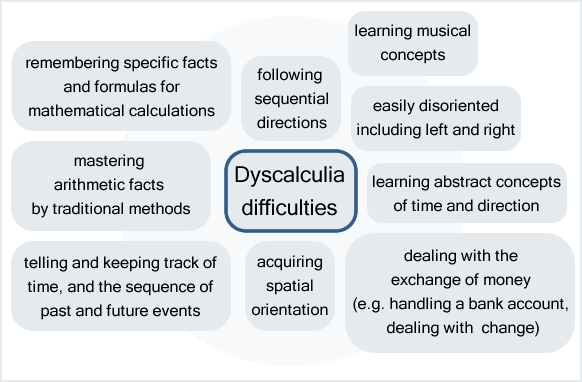 While there is no known cure for dyscalculia, there are things children with dyscalculia can do to overcome the challenges they may face.
While there is no known cure for dyscalculia, there are things children with dyscalculia can do to overcome the challenges they may face.
- One of the easiest things a child can do to help them recognize numbers and patterns is to just simply practice. There are many games you can download from the internet. When looking for a dyscalculia game for your child, keep in mind you want it to be age appropriate, you want it to appeal to your child, and you want it to be something your child doesn’t recognize as a “learning” experience. If your child thinks he/she is doing homework, or learning, they may resist.
- Another thing you can do to help your child overcome his/her learning disability is use flash cards. Something as simple as buying (or if money is tight, you can make them) number flash cards. Mix the cards up, and practice number recognition. Make it a game. See how many they can get right. Reward correct answers, and give positive re-enforcement for incorrect answers.
- Buy a bag of jelly beans. Pour a few out onto a table or flat surface. Have your child count out a certain number of jelly beans. Or have him/her separate the jelly beans into piles – one for you and one for them. You can switch colors with them (example: ask your child to switch 2 blues for 2 reds. You can do simple math with the jelly beans. Then after, your child gets to eat them!
- Play a game with a stop watch. Have your child be the time keeper. See how long it takes for someone to run across the yard (or take 10 steps, or anything you can make a race with). Tell your child to watch the clock. Give them a time to stop the clock at (for example, tell them at 8:40 to stop timing.) Show them on the clock where the hands will be.
While there is no cure for dyscalculia, you can treat the symptoms. Remember to use patience and love with your child. They’ll be just fine.  (You can read more tips here.)
(You can read more tips here.)
If you’d like a recommendation for dyscalculia games, Making Math More Fun is one I highly recommend.
Tips On How To Help Your Child Overcome Dyscalculia
As a parent, some of the most challenging times is dealing with your child’s education, development, and homework. When your child enters grade school, the dynamic of it all kind of changes. Before, you used to have complete control over your child’s development, schedule, day, interaction with others…but once school starts, a parent has to hand over the gauntlet to his/her teachers.
Once your child goes to school, some concerns may begin to arise that were never even a concern before. Learning disabilities,and social acceptance are just a few.
 Once it becomes apparent your child has a learning disability, this can shake things up a bit in your world. How do you handle it? How do you help your child overcome it? Many questions can arise, along with fear and stress. Most learning disabilities have treatment options, and different ways to help your child develop on time and on target with the rest of his/her class.
Once it becomes apparent your child has a learning disability, this can shake things up a bit in your world. How do you handle it? How do you help your child overcome it? Many questions can arise, along with fear and stress. Most learning disabilities have treatment options, and different ways to help your child develop on time and on target with the rest of his/her class.
Dyscalculia is one learning disability you may face with your child. It’s much like dyslexia, only it’s having difficulty with simple math concepts. Working with your child to recognize numbers and understand math is obviously the first step. Software to help your child is also available. Making Math More Fun is a printable math games collection I personally recommend.
Tips on How to Help Your Child Overcome Dyscalculia – What to do if your child has dyscalculia
1. Get a math workbook from Target or Walmart (you can usually pick one up for relatively cheap, a few dollars). Start at the beginning. Instead of getting a workbook for your child’s age group, start off with the absolute basic and easiest you can find. Example: preschool and kindergarten levels. This will help you in determining exactly what your child is struggling with, and what they do and don’t understand.
2. Spend some time every night sitting with your child helping them and encouraging them. Watch them answer questions, and answer any questions they might have with patience.
3. Download a software game they can play to help encourage math learning, and recognition.
4. Buy some flash cards (again from Walmart or Target – a few dollars at most). Spend a few minutes each night going through them. Shapes, numbers, and simple addition problems will work the best. (Dyscalculia is not to be confused with a child just struggling with math in general. That’s to be expected. Read more about symptoms of dyscalculia here.)
If your child has been diagnosed with dyscalculia, do not worry. If it’s left untreated of course it can cause issues in your child’s life, but many children are able to overcome this learning disability and go on to become doctors, and lawyers. Do the best you can to support your child emotionally, and offer as much help and guidance as you can…and the rest will follow.
What To Do If Your Child Has Dyscalculia
It can be overwhelming and quite scary when you find out your child has dyscalculia. Many parents often feel lost and confused, and don’t know which direction to turn when they find out their child has a learning disability. You might blame yourself, or become angry at your child. It can be hard for some people to understand why certain things are difficult for certain people.
What To Do If Your Child Has Dyscalculia
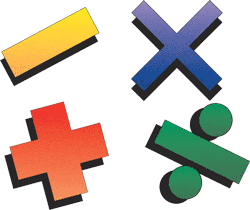 If your child has the learning disability, first of all…take a deep breath. All hope is not lost. It’s a very common learning disability that can be treated with time and patience. If your child is diagnosed with math and dyslexia, you can help them overcome it with these ideas:
If your child has the learning disability, first of all…take a deep breath. All hope is not lost. It’s a very common learning disability that can be treated with time and patience. If your child is diagnosed with math and dyslexia, you can help them overcome it with these ideas:
- Help your child practice basic math skills, either online or offline. You can use flashcards to help recognize shapes and numbers, or software programs to help them understand the basic math skills.
- Check into getting your child a tutor. Make sure that the person you choose has experience and an understanding of what dyscalculia is.
- Talk to your child’s teacher. Come up with a game plan that works for all parties involved. Make sure that your child won’t feel the pressure of peer ridicule.
- Purchase math workbooks and sit with your child while they work through them. Be patient, and remember to give positive encouragement as they get through them.
If your child has been diagnosed with math and dyslexia, don’t worry. You can help your child overcome this with patience and time. Be diligent and understanding. In time, this will be something you both look back on and remember as just being “a learning experience!”
If you would like more information on great learning and practice tools you can use, here is one I personally recommend: Math Worksheets for Children With Dyscalculia.
What are Some Symptoms of Dyscalculia in Kids?
If you’ve landed on this page, you’ve most likely suspected your child may have dyscalculia. If this is the case, don’t worry. Kids with dyscalculia are most often treated with the right steps and help. Not every child will have all the symptoms, and not every child will have these symptoms either. These are just a base to give yourself an idea.
Some symptoms of dyscalculia include (but are not limited to):
- Unable to write down numbers in numerical order, or unable to recognize numbers.
- Uunable to understand simple math concepts, such as odd/even numbers.
- Shape recognition (difficulty recognizing simple shapes, such as circles, triangles, and square)
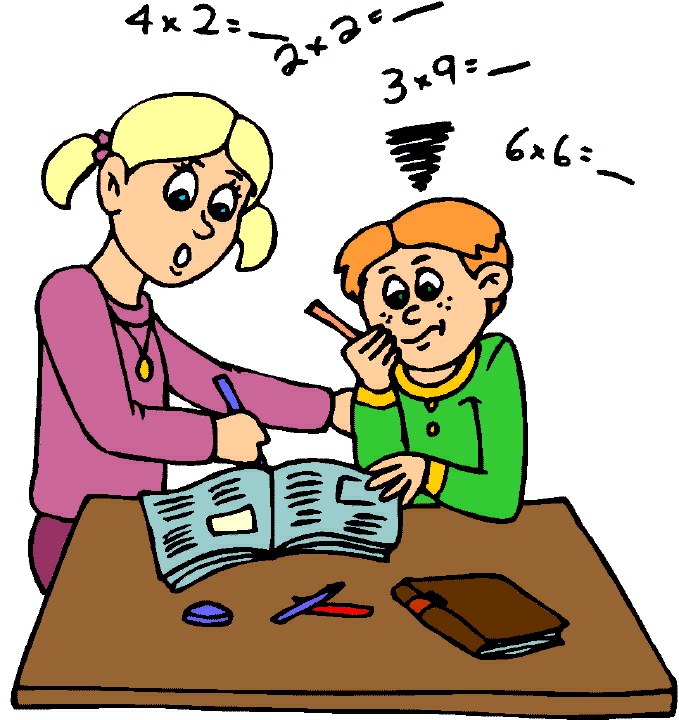 If you think your child might have the learning disability, there are things you can do. First, you may want to take this test (it will give you a clearer understanding of exactly what your child struggles with). There are books, and software, and many options available to you. A tutor may be something you might consider, or talking to your child’s teacher to see if they have any ideas.
If you think your child might have the learning disability, there are things you can do. First, you may want to take this test (it will give you a clearer understanding of exactly what your child struggles with). There are books, and software, and many options available to you. A tutor may be something you might consider, or talking to your child’s teacher to see if they have any ideas.
There are literally thousands of children a day who struggle with something in their life. It’s part of growing up. Struggling with math can effect a child’s self esteem, as can struggling with anything. Helping your child practice something is generally the best way we can show support as a parent.
Diagnosing dyscalculia for your child should definitely not be your first instinct. If you think your child has dyscalculia, look deeper. Talk to your child’s teacher, really assess what your child is having difficulty with. If it’s just normal difficulty with math, that’s nothing to worry about. If you think it is further than that and is truly a learning disability, talk to a specialist, and most importantly, talk to your child. You will find out a lot by just talking to your child.
If your child does have dyscalculia, do not worry – there are ways you can treat the learning disability and help your child overcome it. Here is a fun way to practice math your child may enjoy. It’s a printable math games collection, and it was developed specifically for kids who have difficulties with math. You can find out more about the games here.
How Can Kids with Dyscalculia be Effected?
Dyscalculia is a learning disability that effects many children, as well as adults. It is a learning disability with math. They tend to have problems understanding it, and grasping even simple concepts such as counting, or telling time.
Kids with Dyscalculia
 Dyscalculia can effect children in many ways, and this article will hopefully give you some insight as to why it is extremely important to treat dyscalculia as soon as you realize it’s apparent.
Dyscalculia can effect children in many ways, and this article will hopefully give you some insight as to why it is extremely important to treat dyscalculia as soon as you realize it’s apparent.
The list below is not in any particular order, and is only meant for you to think about.
1. For a child, being accepted by their peers is a very important part of growing up, and it has a huge effect on your child’s confidence as an adult. Having any type of learning disability is difficult to overcome, and many children feel inferior to other kids their age when they can’t do things as well as others.
2. Add to this, that children are mean. That statement is not meant to be taken out of context. I simply mean children have a learning curve as they grow up on how to behave socially. They say what’s on their mind, and they make judgement calls based on what they see and feel. It’s not until many years of experience and growing up do most children look beyond their world and see that the world itself is filled with different kinds of people.
Children with dyscaclulia may suffer from the ridicule and embarrassment of their classmates.
3. The domino effect. If a child feels inferior or inadequate in any thing in their lives, it’s very easy to give up on it. Once they give up on it, and possibly withdraw in other areas of their lives, it’s highly likely they will continue that path on through high school. Grades may slip, the child may give up on trying all together.
After high school (if they end up graduating) they may opt out of college, or they may start looking for a job. Without an education (high school at least), what kind of job do you think your child will end up with? On that same note, what kind of job doesn’t include math or numbers? Not many, and certainly not many high paying jobs.
Math is in everyday life, no matter what you do or where you go. We don’t have to be geniuses in the subject, but grasping the simple concepts are a must. We must be able to tell time, we must be able to know in what order the numbers go, and we must be able to understand addition/subtraction/multiplication/division.
If your child has dyscalculia (or you suspect they do), do not worry. There are ways for your child to overcome dyscalculia. There are books, and software your child can use that help them learn the math skills they need for everyday life. Ask your child’s teacher to give you updates on your child’s progress, and above all, support your child in their journey. (Take a quick test for a short assessment of your child.)
If you would like more information on a fun package that helps kids with dyscalculia, you can check it out here.
What is the Learning Disability Dyscalculia?
Have you noticed that your child does well in every subject (for the most part!) except for math? Are you noticing difficulties when they try to solve mathematical equations, or problems? Have you searched and tried everything you can to help your child do better? Have you spoken with your childs teacher and asked them to focus on certain topics to help your child? If your child is not doing very well in math and you’re afraid they’re not getting enough help in school keep reading.
What is the Learning Disability Dyscalculia?
 Something you may not realize yet, is your child could be suffering from Dyscalculia. Dyscalculia is learning disability that causes learning problems with math, and symptoms can vary. If your child is not doing as good as they could be in math, it’s very possible they have dyscalculia. With the right help, and practice,soon your child will be doing better on their exams and grades.
Something you may not realize yet, is your child could be suffering from Dyscalculia. Dyscalculia is learning disability that causes learning problems with math, and symptoms can vary. If your child is not doing as good as they could be in math, it’s very possible they have dyscalculia. With the right help, and practice,soon your child will be doing better on their exams and grades.
Dyscalculia is not something you should take lightly. If your child is suffering from this dysfunction it is important you get them help fast. The last thing you want as a parent is for your child to experience set backs in the classroom and further on in life. Dyscalculia is not a disability that will go away on its own. Do not for one moment start to believe your child will soon outgrow it. That is not going to happen. Math anxiety will stick with them for the rest of their life, unless you do something about it right now. (You can take a quick dyscalculia test here.)
Math can be fun and it does not have to be confusing. Often in many classrooms there will be numerous children who will develop difficulties with math. The teacher is not going to delay the entire class to only help those few individuals. Your child needs help and they are not going to get it from their school. So it is going to be your job to get them that help outside of school and these tips are going to help.
Stop letting math get in the way of your child’s future. If you would like for them to begin doing better in school, now is the perfect time they start looking at math in a new easy and fun way. Let them use these fun math games to discover just how simple math really is. Your child deserves the best in everything. So let them do better in school by following these simple methods right away!
Dyscalculia Symptoms – What to Look For
Dyscalculia symptoms can range from moderate to extreme, but regardless of your child’s level of difficulties they’re having with math, it should not go left untreated. You can find a great treatment option here. Keep reading below to find out more about dyscalculia symptoms.
- Your child can not write and copy down numbers in the correct order.
- Your child has difficulties recognizing shapes, such as circles, triangles, and squares.
- Your child can not differentiate between even and odd numbers.
- Your child can not tell you the time from an analog clock.
- Your child can not understand fractions.
- Your child has anxiety when it comes to math.
There are many more symptoms that can point to dyscalculia. Just as the symptoms listed above are not meant to be the deciding factor of whether or not your child has dyscalculia. The list above is meant to be a starting point, and should be  used a guideline only. In addition, they should be age appropriate. Of course, if your child is 4 and can’t tell you the time, that would not be a clear test, since most 4 year old children have no clue how to read a clock.
used a guideline only. In addition, they should be age appropriate. Of course, if your child is 4 and can’t tell you the time, that would not be a clear test, since most 4 year old children have no clue how to read a clock.
One of the biggest ways to tell if your child may have the learning disability is just by whether or not your child has difficulty in math period. Ask your child’s teacher how your child is doing in math. If your teacher is concerned, they will most certainly tell you.
Something to remember, just because a child has difficulties with math doesn’t necessarily mean they have the learning disability either. There are tests your child can do, and treatment options to help your child overcome their difficulties with math. You can take a quick and free dyscalculia test here.
